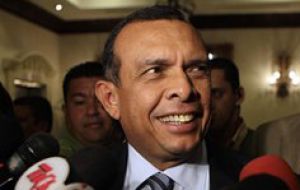MercoPress. South Atlantic News Agency
Honduras overwhelmingly votes against reinstatement of Zelaya
 Porfirio Lobo will be the president to lead Honduras from its current prostration as of next January.
Porfirio Lobo will be the president to lead Honduras from its current prostration as of next January. Honduras’ Congress overwhelmingly voted Wednesday against the reinstatement of ousted President Manuel Zelaya, a move that closes the door on his return to power after he was toppled in a June coup.
The congressional vote was part of a United States-OAS (Organization of American States) brokered deal between the deposed leader and the country's de facto government that took over following the coup land headed by Roberto Micheletti.
A majority of the 126 members of Congress in session voted against Zelaya's return to power, throwing his future into question. Zelaya has been holed up in the Brazilian Embassy since he sneaked back into Honduras in September.
Congress had already reached the simple majority needed to block Zelaya's reinstatement, but as the vote carried on late into the evening, it appeared the margin would be even wider.
Opposition conservative candidate Porfirio Lobo (who had lost to Zelaya by a slim margin in 2005) won Sunday's presidential election in Honduras. The United States quickly recognized the results but said the vote was only a partial step toward restoring democracy.
The stance has split the hemisphere with United States and a few countries such as Panama, Costa Rica, Peru and Colombia recognizing Sunday’s results and the rest of Latinamerica headed by Brazil and Argentina that say it is impossible to accept an election organized by a de facto government.
On June 28 during the so called “pyjama coup” Zelaya was taken from his bed by the military and sent into exile to neighbouring Costa Rica on a military plane. Critics say he was aiming at a constitutional overhaul in an attempt to stay in power, a charge he denies.
As elected president from the Liberal (conservative) party he also angered business leaders and members of his own grouping by moving closer to Venezuela's president, Hugo Chavez who begun supplying Honduras energy-short with oil in long term conditions.
The Supreme Court ordered his arrest, charging him with violating the constitution and Congress then voted to strip him of his powers.
Lobo's conservative National Party took a firm stance against Zelaya in Wednesday's session. “If we reinstate Zelaya, it will be worse for the country, the crisis would continue, and democracy would once again be in danger,” National Party congressman Victor Barnica said.
All candidates participating in Sunday’s election including Elvin Santos from Zelaya’s Liberal party accepted victory from Lobo and insist the scheduled elections (unrelated to the coup) were legitimate and according to Honduran political calendar.
Earlier in the afternoon the European Union reiterated its condemnation of the violation of constitutional order in Honduras that took place on 28 June 2009, but also accepts that Sunday elections are a significant step forward in solving the crisis.
“The EU has since the beginning of the crisis called for a peaceful negotiated solution to the political crisis and has taken steps with other international partners to bring this about”.
“The EU regrets that the Tegucigalpa/San José Accord has not been fully implemented ahead of the elections on 29 November, leading to an electoral process under abnormal circumstances”.
“However, the European Union sees the elections as a significant step forward in solving the crisis in Honduras. In this regard, the European Union awaits the outcome of the deliberations of the Honduran Congress scheduled for 2 December 2009”.
Finally the EU calls upon all actors to seek a dialogue in order to reach national reconciliation and to re-establish constitutional and democratic order in the country, and expects them to assume their full responsibility in this regard. The EU demands that all actors promote and respect the rule of law, good governance and human rights.
Honduras is considered the third poorest country of the Latinamerica and the Caribbean behind Haiti and Nicaragua. Almost half of its national budget is met with international grants and the country has preferential trade agreements with the United States.




Top Comments
Disclaimer & comment rulesCommenting for this story is now closed.
If you have a Facebook account, become a fan and comment on our Facebook Page!